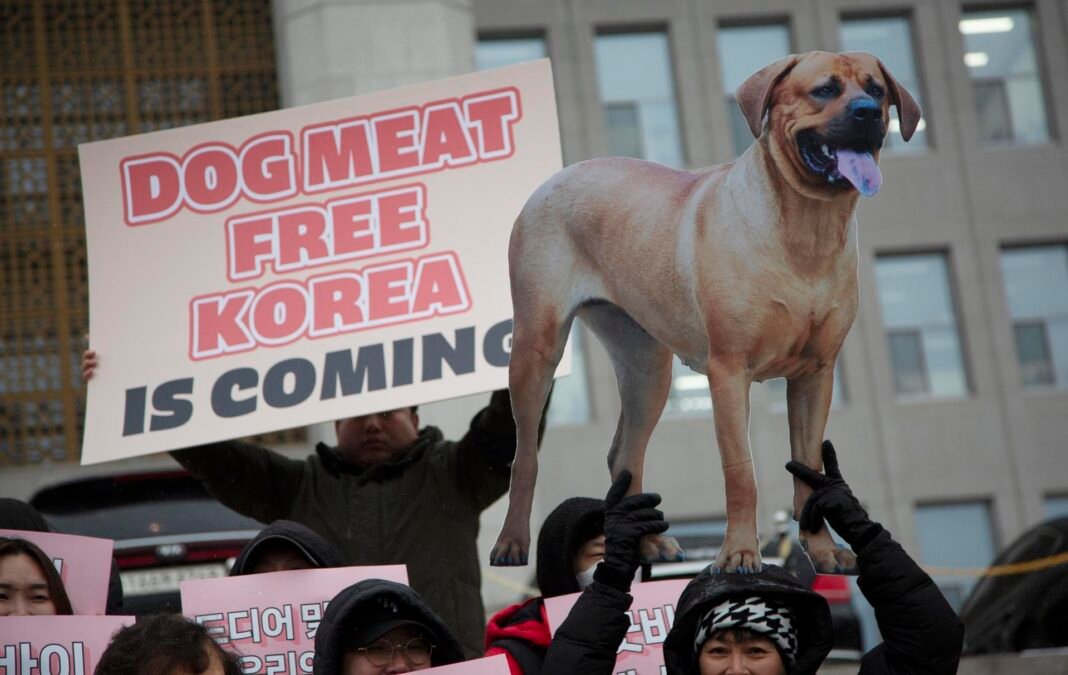South Korea has passed a landmark law banning the dog meat trade, signaling a significant shift in cultural attitudes toward this controversial practice. The ban, which has faced opposition from some older citizens, aligns with the current administration’s animal-friendly stance.
Generational Divide
Lunchtime Scene in Seoul
A scene in Seoul highlighted a generational divide, with older individuals expressing disappointment over the ban, citing a long-standing tradition.
Mixed Reactions from Citizens
While some citizens, especially the younger generation, support the ban, older individuals argue for the preservation of their culinary traditions.
Government’s Animal-Friendly Stance
President’s Support for the Ban
President Yoon Suk Yeol and First Lady Kim Keon Hee, known for their love of animals, have publicly supported the ban on dog meat.
Growing Official Backing
Official backing for the ban has increased under President Yoon, emphasizing a shift in the government’s stance on animal welfare.
Opposition from Dog Meat Farmers
Farmers’ Campaign Against the Ban
Dog meat farmers campaigned against the ban, suggesting that the declining popularity of the practice among young people should allow it to naturally fade out.
Cultural Shift and Global Context
Changing Attitudes Among Younger Koreans
Eating dog meat is increasingly considered taboo among younger, urban South Koreans, reflecting evolving cultural norms.
Global Comparison
The ban aligns South Korea with global sentiments against consuming dog meat, contrasting with countries like China and Vietnam where the practice persists.
Shifting Cultural Dynamics
Taboo Among the Young
The taboo surrounding dog meat consumption is particularly evident among the younger, urban population in South Korea. Changing societal norms, coupled with increased awareness of animal rights, have led to a significant decline in acceptance of this traditional practice.
Global Trend Towards Compassion
South Korea’s decision to ban the dog meat trade aligns with a global trend towards more humane treatment of animals. The contrast with neighboring countries, like China and Vietnam, underscores the evolving attitudes within South Korea.
Government Leadership and Public Opinion
Animal-Friendly Administration
President Yoon Suk Yeol’s administration, known for its pro-animal stance, reflects a broader shift in public sentiment. The President’s adoption of stray dogs and the First Lady’s vocal criticism of dog meat consumption have contributed to a government more attuned to animal welfare concerns.
Overwhelming Public Support
A recent survey by the Animal Welfare Awareness, Research, and Education think tank indicates that nine out of ten South Koreans would refrain from eating dog meat in the future. This overwhelming public support suggests a seismic shift in attitudes that has influenced legislative action.
Economic Concerns and Compensation
Impact on Dog Farmers
The new law includes provisions for compensation, aiming to assist businesses in transitioning out of the dog meat trade.
A Balancing Act
The challenge for South Korea lies in finding a delicate balance between acknowledging cultural traditions and responding to evolving ethical considerations. The provision for compensation recognizes the economic challenges faced by those dependent on the industry.
Future Prospects and Global Image
A Forward Step
South Korea’s ban on the dog meat trade positions the country as a global advocate for animal welfare. The international community will likely view this decision positively, contributing to an enhanced global image for South Korea.
Navigating Tradition and Modernity
As South Korea embraces a “dog-friendly future,” it faces the task of navigating the delicate intersection between tradition and modernity. The ban represents a step towards aligning cultural practices with evolving ethical standards, marking a pivotal moment in the nation’s history.
In conclusion, South Korea’s journey towards banning the dog meat trade is a multifaceted narrative of cultural transformation, government leadership, economic implications, and global positioning. The ban not only signifies a triumph for animal rights but also prompts a broader conversation about societal values and the delicate balance between heritage and progress.
FAQs
- What does the new law entail? The law prohibits the trade of dog meat, reflecting a growing consensus against this practice in South Korea.
- How have animal rights groups reacted? Animal rights groups, long advocating for such a ban, have welcomed the decision as a historic step towards ending the suffering of millions of dogs.
Conclusion
South Korea’s ban on the dog meat trade marks a pivotal moment in the country’s cultural landscape. While met with resistance from some older citizens, the decision reflects a broader societal shift towards compassion for animals. The generational and cultural divides underscore the complexity of navigating tradition and evolving ethical considerations.
More Stuff from West Nia :
- AC Milan’s Star Midfielder Nears Exciting Move to the Turkish Realm
- Tragic Plane Crash Claims Christian Oliver and Daughters
- FAA Mandates Grounding of Specific Boeing 737 Max 9 Aircraft Post Alaska Airlines Incident
- Rose Bowl Drama: Michigan’s Triumph and Alabama’s Heartbreak
- Liverpool Secures a Thrilling Victory Against Newcastle United
- Lee Jae-myung Stabbed in the Neck During Visit to Busan
- Remembering a Legend: Starsky & Hutch’s David Soul Passes Away at 80
- UK Stocks Dip in Risk-Off Mood
- Michigan Sells $842 Million Powerball Ticket
- Harvard President Claudine Gay Resigns
- Thunder’s Triumph: Gilgeous-Alexander’s 36 Points Lead Thunder to Fifth Consecutive Victory Over League-Leading Celtics
- Earthquake of 4.2 Magnitude Hits Inland Empire; No Significant Damage Reported


